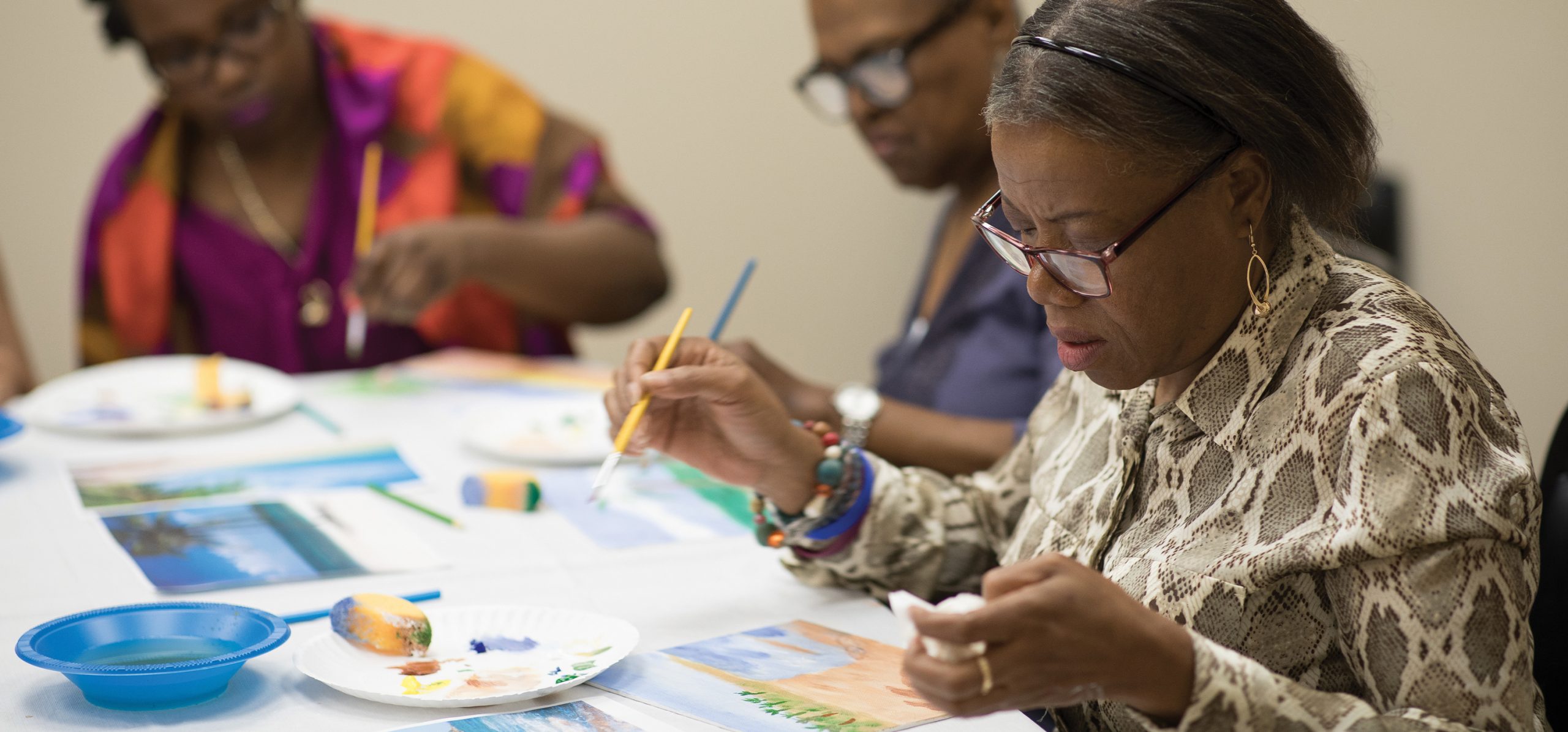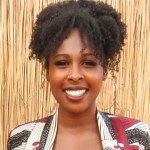
When Nancy Dejoie of the Bronx was diagnosed with advanced breast cancer, she had many concerns: How will surgery and chemotherapy affect my body? What does my course of treatment entail? Will I feel well enough to take care of my husband and children and to do the things I love? Fortunately, Mrs. Dejoie wasn’t alone. She received life-changing help from a volunteer peer counselor—a cancer survivor herself—through Bronx Oncology Living Daily (BOLD Living), Montefiore and Einstein’s free wellness and support program for local cancer patients.
“My BOLD Buddy [as peer counselors are known] called me every day to ask how I was doing and answer my questions,” says Mrs. Dejoie, a native of Haiti. “She knew exactly what I was going through and helped me in ways I cannot describe. She motivated me to fight the disease.”
Mrs. Dejoie also took advantage of BOLD Living’s classes in Spanish language, painting, and crocheting—just a sampling of the program’s diverse offerings. “They even provided tutors and school supplies for my kids,” she adds.
Taken with the program, she became a peer counselor herself even before completing her own treatment. “I wanted to give back, to be like the people who inspired me,” says Mrs. Dejoie, one of three dozen BOLD Buddies at Montefiore.
Credit for BOLD Living belongs to Alyson Moadel-Robblee, Ph.D., who was just 16 when she lost her mother to breast cancer. This life-changing experience ultimately led her to pursue a doctorate in health psychology at Einstein and Yeshiva University (Yeshiva now manages the program), followed by a fellowship at Memorial Sloan Kettering Cancer Center in psychosocial oncology—at the time a fledgling subspecialty—which addresses the psychological, behavioral, emotional, and social aspects of cancer care. Dr. Moadel-Robblee then returned to the Bronx to direct a new program in psychosocial oncology and conduct research at the National Cancer Institute–designated Albert Einstein Cancer Center.
With BOLD Living, we aim to address patients’ emotional and social support needs, to complement their medical and surgical care.
—Dr. Alyson Moadel-Robblee
Dr. Moadel-Robblee is now the associate director of community outreach and engagement at the cancer center and a professor of epidemiology & population health, of medicine, of radiation oncology, and of psychiatry and behavioral sciences at Einstein. Over the years she has steadily added more services to help people in marginalized communities cope with cancer.
“From talking with patients, I learned that they wanted nutrition and fitness workshops and mind-body programs so they could take an active role in their care,” she says. “Others expressed a desire to talk with somebody who understood firsthand what they were going through or who could accompany them to treatment.”
With these requests in mind, in 2008 Dr. Moadel-Robblee launched BOLD Living. It has since evolved to include a host of wellness workshops, individual counseling and support groups led by mental-health interns, cancer screening navigators, community outreach efforts, BOLD Buddies, end-of-life doulas, and BOLD Brother/Sister Peer Mentors (for teens and young adults who have parents diagnosed with cancer).
“With BOLD Living, we aim to address patients’ emotional and social support needs, to complement their medical and surgical care,” Dr. Moadel-Robblee says. “We’re here as an important piece of the healthcare system to ensure that all patients have access to culturally informed and needs-based psychosocial resources for the best quality of life and care possible as they navigate cancer diagnosis and treatment.”
Today, the BOLD Living team reaches more than 1,000 patients and community members a year. Services, available in English and Spanish, are free to all people in the Bronx affected by cancer or in need of cancer screening navigation, regardless of where they receive their medical care.
Weekly counseling and support groups led by mental-health counseling interns; volunteer peer counseling.
Free peer-mentoring program for teens and young adults who have or have had a parent or close caregiver diagnosed with cancer. In addition to the emotional support they receive through their BOLD brother/sister mentors, mentees receive career and academic guidance.
Groups (one in English, one in Spanish) that offer a safe place for those interested in sharing their thoughts and feelings, connecting with others, and learning how to cope with day-to-day challenges.
Free nutrition, wellness, and fitness workshops and mind-body programs for patients and caregivers. The schedule offers yoga, dance, creative arts, meditation, health education, and more.
A program (Montefiore-Einstein BOLD Navigation) offering free assistance in scheduling screenings for breast, cervical, lung, colorectal, and prostate cancers as well as providing follow-up support for understanding screening results.
2008
The BOLD Living Program was launched to meet the needs of those affected by cancer in the Bronx.
1,000+
Number of patients and family members who receive no-cost services each year.
10+
Number of free workshops per month, conducted in person in the Bronx and virtually.
Glenn and Marietta Alba encountered BOLD Living in a different way. In 2015, Glenn’s mother, Dotty Kelly, was diagnosed with stage four lung cancer. Preparing for the worst and hoping for the best, she sought care from Shalom Kalnicki, M.D., professor of radiation oncology and of urology at Einstein and chair of radiation oncology at Montefiore. Dr. Kalnicki found that her tumor was a good genetic match for a new immunotherapy; combining it with radiotherapy put her cancer into remission.
The Albas weren’t done with Montefiore’s oncologists just yet. Two years later, Mrs. Alba was diagnosed with stage one breast cancer. “Needless to say, it was shocking,” she says. “But I was fortunate to have the support of my husband and access to the best care.”
We wanted to ensure that other families who are struggling with this disease have the support they need, and that these services would be free.
—Mr. Glenn Alba
After undergoing a lumpectomy and radiotherapy, Mrs. Alba left Montefiore with a clean bill of health—and a deep sense of gratitude. “We wanted to find a way to give back to Montefiore and the greater Bronx community,” she says. “My parents grew up in the Bronx, and I have fond memories of family celebrations there. So it’s meaningful for me to stay connected in this way.”
Once they heard about BOLD Living, the Albas knew exactly where they would direct their philanthropy. “Cancer can have such a profound psychological impact on both patients and caregivers,” Mr. Alba says. “We wanted to ensure that other families who are struggling with this disease have the support they need, and that these services would be free.”
In 2020, the Albas, who now live in Florida after many years in New Jersey, established the Marietta and Glenn Alba Fellowship in Psycho-Oncology. The two-year training program provides an opportunity for a Ph.D.-level psychologist to expand BOLD Living’s clinical reach, conduct research into health disparities, and ultimately spread this model of care further afield.
The first recipient of the Alba fellowship is Brittany Miller, Ph.D., a graduate of Stony Brook University’s doctoral program in social and health psychology.
“During my studies, I heard a lecture about integrating psychological care into standard cancer care alongside the work of radiologists, pathologists, and other specialists,” recalls Dr. Miller, whose dissertation focused on attitudes about preventive breast health behaviors among young adult Black women. “I thought, ‘I would love to do that type of work, particularly in an underserved community.’” As luck would have it, the Alba fellowship launched just when Dr. Miller was contemplating the next step in her career.

Many people here are already dealing with housing instability, food insecurity, and other pressures. If you add the stress of having cancer, it can be overwhelming.
—Dr. Brittany Miller
At Montefiore, Dr. Miller has had a hand in all aspects of BOLD Living, giving her opportunities to put her new skills into practice and broaden her professional horizons. “At Stony Brook, I focused on cancer prevention. Now I’m more involved in the actual cancer experience, from diagnosis all the way through to survivorship, which has provided me with a more comprehensive view of the experiences with this disease,” she says.
Thanks to the Alba fellowship, Dr. Miller has become immersed in the life of the community, where she’s able to put academic theories into everyday practice. Alongside BOLD interns and Buddies, she visits health fairs, food pantries, and shelters, and is launching a program to include places of worship as well. It has been an eye-opening experience. “Many people we encounter have never had certain cancer screenings,” she says. “They don’t even know where to start. So we walk them through the process and connect them to everything they need—including BOLD Living—should they receive a cancer diagnosis.
“I understood beforehand that cancer can affect every aspect of your life, but I didn’t realize to what extent, particularly in a vulnerable community like the Bronx,” she adds. “Many people here are already dealing with housing instability, food insecurity, and other pressures. If you add the stress of having cancer, it can be overwhelming.”
Dr. Miller’s portfolio also involves three research projects, including efforts to improve cancer screening and support services in the Bronx lesbian, gay, bisexual, transgender, and queer community; develop a free training series for Bronx church leaders to help improve cancer outcomes among their congregants; and better understand how to encourage engagement with mental-health services among female cancer patients and cancer survivors in the Black community.
“I’ve also been learning so much about the various cultures here, and their different beliefs about cancer and mental-health care,” she continues. “For some groups, talking about these topics is taboo. If you want to engage people and promote healthy behaviors, you have to develop culturally sensitive strategies. Our interns and BOLD Buddies, who reflect the diversity in the community, have been a great resource. The Buddies in particular bring so much wisdom from their own experiences with cancer. I’ve learned a lot from them.”
One of those fonts of wisdom is Harmon Kennedy, a longtime Bronx resident who received a colorectal cancer diagnosis in 2011. Mr. Kennedy became a BOLD Buddy a few years later, after treatment brought his disease under control. “It’s great to have friends and family to talk to, but so often, they don’t really understand,” he says.
“If they haven’t gone through cancer, they don’t get it. You want to know what is going to happen to you, what chemo is like. Ten years after my last treatment, I can still remember them sticking needles into me. I remember the taste of chemo in my mouth. That’s what I can share with patients. When they meet me and hear my story, I can see the relief. I would have liked to have talked to someone when I was diagnosed.”
While some patients need only a few months with a BOLD Buddy, others stay in touch for years. “I knew Charlie, my first patient, for almost five years,” Mr. Kennedy says. “We became friends. Charlie passed on a few years ago, but at least I got to say goodbye. For Buddies, the hardest thing is the people you lose, especially the ones you don’t get to say goodbye to, like Elaine. She just stopped contacting me, and I didn’t know why. She wasn’t the type not to stay in touch. I learned later from her doctor that she had passed away. It affected me badly. I had survivor’s remorse. It was like losing a member of the family.”
Still, Mr. Kennedy feels an inseparable bond to BOLD and its mission. “Every cancer patient deserves a Buddy,” he says.